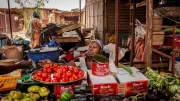Recent Blogs
Blog
Driving Change: Hello Tractor and ABERA
CGAP, IDH, FSD Network & FSD Kenya are working with Hello Tractor as part of ABERA, which empowers rural women in agriculture. We aim to address gender and climate challenges while strengthening Hello Tractor's business and financial service links.Blog
Are Climate-Related Financial Sector Policies Inclusive for All?
Climate-driven financial policies could inadvertently end up undermining financial inclusion efforts. Authorities and funders must understand the pathways through which risks could occur and the opportunities for supporting green finance effectively.Blog
How Do Financial Systems Support Climate Resilience?
The third in our three-part blog series with Decodis and MSC discusses our finding that different climate events, and different phases of those events, drive different needs for financial services.Blog
Adapting to or Just Muddling Through Climate Change?
The second blog in our series with Decodis and MSC explores our research finding that many poor households are just muddling through climate events rather than strategically adapting to long-term climate change in ways that enhance their resilience.Blog
How Can Insurance Help Build a Green, Resilient & Inclusive Future?
To ensure those living in poverty benefit from emerging models in insurance, we need to focus beyond traditional risk transfer and look at broader risk management. This blog outlines three priorities for driving systems change in inclusive insurance.Blog
Facing Climate Events in Nigeria, Farmers Left With Scarce Options
Based on interviews with hundreds of farmers in Nigeria, we unpack how households use financial services in responding to climate events.Blog
Lessons From 4 Examples on the Leading Edge of Climate-Focused G2P
All G2P programs contribute to climate adaptation to some extent, with examples in India, Ethiopia, Kenya, and the Philippines showing us how specific program design features can support greater climate adaptation for recipients and their households.Blog
Inclusive Voluntary Carbon Markets Could Finance a Just Transition
New CGAP research suggests that voluntary carbon markets (VCMs) hold the potential to finance a green transition across low and middle-income countries.Blog
Climate-Focused G2P: Beyond Disaster Response
The current focus of G2P programs on emergency response is insufficient to support long-term climate change adaptation. Long-term adaptation must be considered, and designed into programs, to reduce intergenerational vulnerability to climate change.Blog
How Are Climate, Financial Inclusion & Financial Stability Linked?
As financial authorities across the world develop plans to respond to the changing climate, they have opportunities to create a positive feedback loop of expanded financial inclusion and reduced climate risk.Blog
Climate Resilience Through Financial Services: Farzana’s Story
Women, especially those in low-income countries, are faced with higher risk, greater vulnerability, and fewer tools to cope with the impacts of climate change. Financial services can empower women to manage climate risks and build resilience.Blog
Financial Inclusion: An Entry Point to Climate Adaptation for Funders
Development funders are thirsty for guidance and good practices on funding for climate adaptation, not just mitigation. Here, we discuss how funding to support inclusive financial systems may be a great place for them to start.Blog
State of the Climate-Responsive Financial Product Landscape
EMDEs are hit hardest by climate-related disasters and environmental impacts and will need a variety of financial services to adapt and grow more resilient to climate change. Are they getting them? Our product scan provides preliminary insights.Blog
In an Era of Urgent Climate Risk, Does Financial Inclusion Matter?
This year’s World Environment Day theme “Only One Earth” reminds us that this planet is humanity’s only home, with finite resources that we must safeguard. Here, we look not only at who pollutes, but who suffers the impact of climate change most.Blog
Financial Inclusion for an Inclusive, Greener, More Resilient World
In her first blog post as CGAP CEO, Sophie Sirtaine proposes a global agenda for financial inclusion that leads to an inclusive, greener and more resilient world.Blog
As PAYGo Solar Matures, Funders Can Do More to Close the Energy Gap
Pay-as-you-go (PAYGo) solar has enabled energy access for around 27 million customers. Funders can help PAYGo providers further close the energy access gap — while advancing financial inclusion — by focusing on these priorities for the sector.Blog
The Social Impact Credit Trap in Asset Finance
Rapid growth in credit sectors, even if motivated by a desire for social impact, can lead to overindebted customers and insolvent lenders. For funders, it is important to recognize that investing in asset finance is investing in risk management.Blog
Does PAYGo Solar Improve Women’s Lives? A Look at the Evidence
Pay-as-you-go (PAYGo) solar financing has electrified the homes of more than 100 million people. What does the available evidence say about its impact on women?Blog
Asset Finance Innovations Can Advance SDGs – If They Scale Responsibly
New asset finance business models are breaking down old barriers to putting life-changing assets into the hands of poor households. But to meaningfully advance SDGs, they’ll need to scale responsibly, and this is where funders can play a role.Blog




















